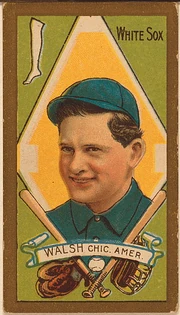CaptainValve (talk | contribs) mNo edit summary |
CaptainValve (talk | contribs) |
||
| (2 intermediate revisions by the same user not shown) | |||
| Line 36: | Line 36: | ||
[[Category:Chicago White Sox managers|Walsh, Ed]] |
[[Category:Chicago White Sox managers|Walsh, Ed]] |
||
[[Category:Major league players from Pennsylvania|Walsh, Ed]] |
[[Category:Major league players from Pennsylvania|Walsh, Ed]] |
||
| − | [[Category: |
+ | [[Category:Players|Walsh, Ed]] |
Revision as of 00:42, 19 February 2007

Ed Walsh of the Chicago White Sox at Comiskey Park in 1913.
Edward Augustine Walsh (May 14, 1881 – May 26, 1959) was a Major League Baseball pitcher. His career ERA of 1.82, while unofficial due to statistical regulations of the time, is the lowest ever recorded.
Born in Plains, Pennsylvania, Walsh had a brief but remarkable major league career. He made his major league debut in 1904 with the Chicago White Sox and pitched his first full season in 1906, going 17-13 with a 1.88 ERA and 171 strikeouts. From this season through 1912, Walsh averaged 24 victories, 220 strikeouts and posted an ERA below 2.00 five times. He also led the league in saves five times in this span. His finest individual season came in 1908 when he went 40-15 with 269 strikeouts, 6 saves and a 1.42 ERA.
In 1910, the White Sox opened White Sox Park, which was soon nicknamed Comiskey Park by the press in honor of team owner Charles Comiskey. The name would be officially changed to Comiskey Park in 1913. A story, perhaps apocryphal, states that Zachary Taylor Davis, the architect who would later design Wrigley Field across town, consulted Walsh in setting the park's field dimensions. Choosing a design that would favor himself and other White Sox pitchers, rather than hitters, Walsh not only made Comiskey Park a "pitcher's park" for its entire 80-year history, but he can be said to be the man who "built" Comiskey Park to a greater degree than Babe Ruth "built" Yankee Stadium, "The House That Ruth Built": While the money the Yankees were making due to fans coming to see Ruth made building the Stadium possible, and the short distance to the right-field fence may have been chosen with Ruth in mind, Ruth did not choose that distance. Walsh appears to have been the man who chose what kind of playing conditions Comiskey Park would have.

|
| Ed Walsh is a member of the Baseball Hall of Fame |

Ed Walsh Baseball Card, 1910.
Interviewed for Lawrence Ritter's book The Glory of Their Times, Hall-of-Famer Sam Crawford referred to Walsh's use of a pitch that would later be outlawed: "Big Ed Walsh. Great big, strong, good-looking fellow. He threw a spitball. I think that ball disintegrated on the way to the plate, and the catcher put it back together again. I swear, when it went past the plate, it was just the spit went by."
Walsh's playing time began dwindling in 1913. Some claim that he came into spring training around this time in poorer physical shape than other members of the White Sox pitching staff, and his pride led him to try to keep up with the other pitchers in terms of pitch speed before getting into adequate shape, thereby causing damage to his pitching arm. By 1916 his arm was dead. He wanted a year off, but Charles Comiskey released him instead. He attempted a comeback with the Boston Braves in 1917, but was let go, ending his major league career. He later did some pitching in the Eastern League and gave umpiring a brief try. After that he was a coach for the White Sox for a few years. He retired with 195 wins, 126 losses and 1736 strikeouts. His career 1.82 is the lowest major league ERA ever posted, but is unofficial since ERA was not an official statistic in the American League prior to 1913.
Walsh died on May 26, 1959. That night, Harvey Haddix of the Pittsburgh Pirates pitched a perfect game for 12 innings before losing to the Milwaukee Braves in the 13th inning.
Walsh was inducted into the Baseball Hall of Fame in 1946. In 1999, he ranked Number 82 on The Sporting News' list of the 100 Greatest Baseball Players, and was nominated as a finalist for the Major League Baseball All-Century Team.
External links
- Baseball Hall of Fame
- Baseball-Reference.com - Major league career statistics
| Preceded by: Johnny Evers |
Chicago White Sox Manager 1924 |
Succeeded by: Eddie Collins |
